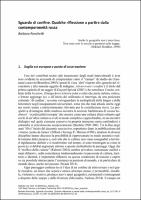Chapter Sguardo di confine. Qualche riflessione a partire dalla contemporaneità russa
| dc.contributor.author | RONCHETTI, Barbara | |
| dc.date.accessioned | 2022-09-15T20:06:43Z | |
| dc.date.available | 2022-09-15T20:06:43Z | |
| dc.date.issued | 2019 | |
| dc.identifier | ONIX_20220915_9788864539102_61 | |
| dc.identifier.issn | 2612-7679 | |
| dc.identifier.uri | https://library.oapen.org/handle/20.500.12657/58265 | |
| dc.language | Italian | |
| dc.relation.ispartofseries | Biblioteca di Studi Slavistici | |
| dc.subject.classification | thema EDItEUR::J Society and Social Sciences::JH Sociology and anthropology::JHB Sociology | en_US |
| dc.subject.other | intercultural studies | |
| dc.subject.other | diversity | |
| dc.subject.other | outsideness | |
| dc.subject.other | Russia and Europe | |
| dc.subject.other | contemporary Russian literature | |
| dc.title | Chapter Sguardo di confine. Qualche riflessione a partire dalla contemporaneità russa | |
| dc.type | chapter | |
| oapen.abstract.otherlanguage | Facing the present in relation to the past, the “outsideness” of Italian Slavic studies can be seen to represent a liminal space between the self and the Other. This article discusses how the image of the Russian poet, who is capable of both satisfying a Russian quest for uniqueness and legitimizing what Western eyes often see as Russian culture’s illegibility, intersects with themes raised in the field of diversity studies. Our close analysis of texts and facts, conducted using a polycentric approach and with reference to notions of “approximation” and “contamination”, acknowledges differences as a step not towards their elimination or homogenization, but towards the “translation” into one’s own culture of voices that were originally distinct. | |
| oapen.identifier.doi | 10.36253/978-88-6453-910-2.35 | |
| oapen.relation.isPublishedBy | bf65d21a-78e5-4ba2-983a-dbfa90962870 | |
| oapen.relation.isbn | 9788864539102 | |
| oapen.series.number | 43 | |
| oapen.pages | 10 | |
| oapen.place.publication | Florence |

